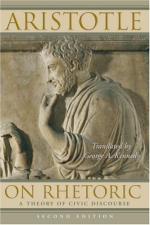
|
| Name: _________________________ | Period: ___________________ |
This quiz consists of 5 multiple choice and 5 short answer questions through Book III, Chapters 1-9.
Multiple Choice Questions
1. Why did Aristotle prefer the periodic prose to the free-running prose?
(a) Free-running prose had fallen out of fashion.
(b) Periodic prose was more familiar.
(c) Periodic prose was easier to use.
(d) Free-running prose had just been introduced.
2. Why did Aristotle say that metaphors were useful in a speech?
(a) They sounded natural to mostly everyone.
(b) They were used frequently in common speech.
(c) They were not used frequently in common speech.
(d) They sounded natural to everyone.
3. What did Aristotle think the structure of a sentence should always be?
(a) Implied.
(b) Simple.
(c) Detailed.
(d) Clear.
4. Which of the following would be considered an ideal target for a crime?
(a) A weak, poor man.
(b) A reckless, rich man.
(c) A reckless, poor man.
(d) A weak, rich man.
5. In what type of person did Aristotle explain there was an especially strong temptation to commit crimes?
(a) Someone that has already committed a crime, but has not been caught.
(b) Someone that was unaware of the punishment for committing a crime.
(c) Someone that has already committed a crime and has been caught, but not convicted.
(d) Someone that has never committed a crime.
Short Answer Questions
1. In dealing with just and unjust actions, how did Aristotle indicate the law could be considered?
2. What did Aristotle think was the intent of all voluntary actions?
3. Which view did Aristotle think people in their prime had of money?
4. How did Aristotle describe arrhythmic prose for speech writing purposes in Book III, Chapter 1?
5. In Aristotle's opinion, what should a good birth lead to?
|
This section contains 343 words (approx. 2 pages at 300 words per page) |

|




